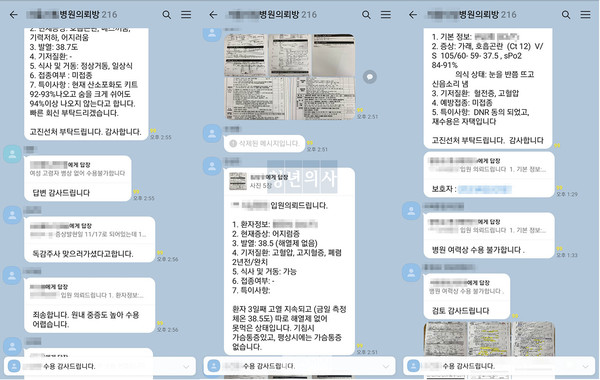When Kakao stopped, the Covid-19 response system also faltered. As Kakao Talk’s “group chat room” went down, the bed assignment was made through wired communication between the managers. All these happened because, for the past three years, the authorities have only relied on Kakao Talk group chat rooms to share information on Covid-19 patients and the status of beds.
After Kakao Talk service was suspended on Saturday afternoon due to a data center fire, the hospital bed allocation team at the emergency response situation room in the Seoul metro region chapter of the Central Disaster Management Headquarters also experienced difficulties conducting business. Hospital and health center officials who communicated through Kakao Talk had to contact by texts, phone calls, and emails. That was because there are no work-sharing channels or backup systems other than Kakao Talk.
The problem of over-dependence on Kakao Talk is hardly new. And in a situation where “there’s no real-time situation board or work system,” the responsibility for and the follow-up management of work delays and confusion were entirely left to medical workers and field personnel.
During the fourth wave of Covid-19 last November, the responsibility for the delay in bed allocation went to public health doctors who worked in the bed allocation team for the Seoul metro region. The public health doctors, who were assigning beds based on the patient information shared through Kakao Talk in the absence of a system or guidelines, became the target of criticism about the “lack of expertise” for failing to check hundreds of Kakao Talks quickly. Public health doctors protested, and the Korean Public Health Medical Association said, “The fundamental reason for the delay in bed allocation is the lack of a systematic system.”

The lack of a system and dependence on Kakao Talk has been pointed out since 2020, the first year of the Covid-19 pandemic. It was revealed that the Covid-19 on-site response team in the greater Seoul area responsible for the Covid-19 bed allocation used Kakao Talk and handwriting to share the status of beds. Rep. Shin Hyun-young pointed out the problem, saying, “It’s been almost a year since the outbreak of Covid-19, so it’s frustrating why we couldn't establish an efficient preparation system.”
Two years have passed since then, and Korea is facing the fourth year of the pandemic response, but an “efficient response system” has yet to be worked out. Finally, the government’s response system falters because of a private company’s service stoppage.
“We have talked about not using Kakao Talk throughout the past three years. Regional managers don't know one another's faces or phone numbers but only know Kakao Talk names,” said an emergency medicine professor at a Seoul university hospital on condition of anonymity. “When we got a phone call, we had to ask who this was. I had to confirm each contact number because Kakao Talk didn’t work. So much so that I could help but wonder if it's not that we are not establishing the system but cannot do so due to the lack of technology.”
Jung Ki-seok, head of the Covid-19 special response team, stressed the composition of regional public-private joint healthcare consultative bodies and their role in the daily briefing on Monday.
“We experienced various confusions due to the Kakao service disruption over the weekend. When such an accident happens, it would be much better to respond on-site immediately rather than the government’s collective delivery of information through such a medium,” Jung said.

